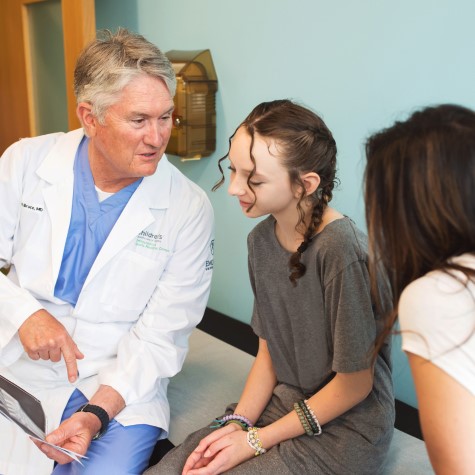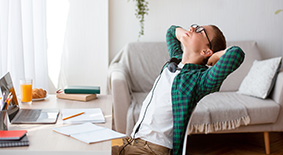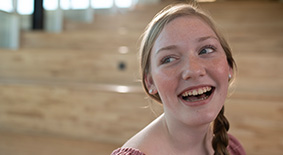Addressing Parents’ Posture Plights: Is Slouching Normal for Teens?
Learn about how tech neck, heavy backpacks and flexibility may affect your child’s growing spine.
A parent’s natural instinct is to want to protect their children from developing back pain, or curves of the spine like scoliosis, and one major concern many parents have is posture.
According to Dennis P. Devito, MD, Medical Director of Children’s Scoliosis and Spine Program, poor posture’s biggest impact on kids isn’t a hunched appearance—slouching hinders the body’s ability to move efficiently.
“When we walk, our head and neck should be centered over our hips. With poor posture comes less efficient movement, meaning fatigue may set in earlier,” he shares. “If you walk or sit bent over, not only are you more likely to tire sooner, but you may develop muscle pain as well.”
In addition to muscle pain in the back, neck and shoulders, Dr. Devito also notes that poor posture can lead to problems in other parts of your child’s body as well. Core strength can suffer as the back and shoulder muscles take on the brunt of the body’s hunched position, while hip muscles may become tight and limit your child’s movement.
Kids growing up today spend a lot more time looking over screens and technology, which can result in poor posture. The term “tech neck” refers to neck pain related to extended periods of time hunching over to look at screens like a computer or a smartphone. While it is a real and relevant pain issue, the good news is that there is no evidence showing poor posture—as a result of technology use or otherwise—will lead to scoliosis or permanent curves of the spine.
“There isn’t one known cause for most cases of scoliosis, but research indicates that poor posture is not a factor.” Dr. Devito explains, “And in general, scoliosis isn’t due to weak muscles, either. Slouching or leaning to one side while sitting, playing or studying does not cause a permanent curve of the spine.”
Similarly, Dr. Devito also fields a lot of questions from concerned parents about their kids carrying a heavy backpack, and whether that kind of daily strain can produce postural scoliosis.
“Generally speaking, we do not see a spinal deformity like scoliosis being created by using a book bag. Even if it’s a heavy book bag,” Dr. Devito says. “We do see back pain related to carrying a backpack and our recommendation is that the bag not weigh more than 15% of the child’s weight.”
So, what can parents do to be proactive about their child’s posture and spine health?
“We like to see children and young adults develop the good habit of maintaining core strength,” Dr. Devito says. “This can be simple exercises, done for a short period of time per day, either daily or 3-4 times per week. This can help reduce low back pain and helps the flexible spine of the child retain a good posture.”
Taking breaks to move and stretch, especially after leaning over a computer or carrying a heavy backpack, can help alleviate any back or neck strain that may cause poor posture, too.
Here are a few ideas to stay active and help improve your child’s posture:
- Encourage breaks to stand and move, especially after leaning over a computer or carrying a heavy backpack. A quick walk or brief dance party can help alleviate any back and neck strain.
- Run through a few stretches—even a stretch as simple as having your child reach down to their toes then up to the sky can help ease any fatigue throughout their back and shoulders.
- Space tasks out during the day to encourage your child to get on their feet at different intervals, breaking up bouts of poor posture.
Parents can feel good about encouraging their kids—even those with a mild to moderate curve in their posture—to be active. “You don’t have to worry or restrict your kids from doing the activities they like,” Dr. Devito says. “They can be as athletic as they’d like, and their spine is not going to curve as a result of that movement.”
“If your child has a flexible but rounded back, I don’t see that as cause for concern; however, if your child or teen is complaining about pain, and they’ve got poor posture that is more rigid or stiff, it may be time to see a specialist,” Dr. Devito says. If your child is experiencing pain and stiffness, your child’s pediatrician may screen for scoliosis and recommend that your child get an X-ray to confirm a scoliosis or kyphosis diagnosis.
If an X-ray confirms a diagnosis of scoliosis, you will then be referred to a specialist like Children’s for treatment options.
While poor posture, caused by tech neck or heavy backpacks, may not directly lead to a scoliosis diagnosis, being proactive about your child’s spine health is important to avoid fatigue and muscle pain. Flexibility and core strength are good indicators of a normally developing spine, but if your child is experiencing pain or stiffness, keep an eye out for some of the signs of scoliosis to determine whether it’s time to seek further testing.

Where you take them matters.
Request an appointment with the only nationally ranked orthopedic program for kids and teens in Georgia, and we’ll help you understand your child’s diagnosis and create a comprehensive treatment plan.
Make an AppointmentDennis P. Devito, MD, is a Pediatric Orthopedic Surgeon and Medical Director of the Scoliosis and Spine Program at Children’s Healthcare of Atlanta. He specializes in the treatment of scoliosis and other complex spinal disorders and deformities in children, adolescents and young adults. Dr. Devito is board certified by the American Academy of Orthopaedic Surgeons, a member of the Pediatric Orthopaedic Society of North America, a fellow of the American Academy of Pediatrics, and offers more than 30 years of pediatric orthopedic surgical experience. Dr. Devito is also a consulting associate for the Duke Department of Orthopaedic Surgery.
This content is general information and is not specific medical advice. Always consult with a doctor or healthcare provider if you have any questions or concerns about the health of a child. In case of an urgent concern or emergency, call 911 or go to the nearest emergency department right away. Some physicians and affiliated healthcare professionals on the Children’s Healthcare of Atlanta team are independent providers and are not our employees.
Contact Us 404-255-1933






